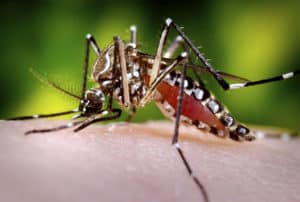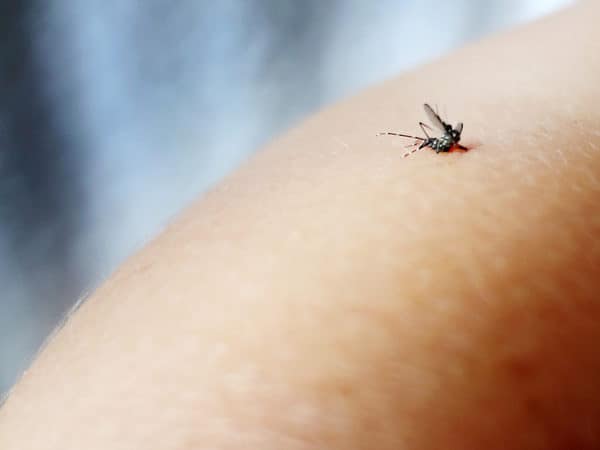I am afraid to go downstairs in my Jesuit community in Managua, Nicaragua. That’s where danger lurks: a terrifying creature that brings about the death of roughly a million people each year. It’s not lions, tigers, or bears (oh my). No, something far more dangerous.
Mosquitoes.
Mosquito-borne illnesses have had devastating effects on human populations throughout history. Take as an example French efforts to construct the Panama Canal. In 1892, after 11 years of work, the French abandoned the project after one-third of their workforce was wiped out by yellow fever. Or how about malaria? The annual death toll peaked around 2 million people during the first half of the 20th century.1. Here in Nicaragua, my coworker Aura Emilia tragically lost her 37-year old sister-in-law last month to a case of severe dengue that rapidly became fatal after just a couple days of symptoms. I was stunned by the abruptness of it all: an unattended fever, an all-too-late hospital visit, a tragic death, and the funeral just two days later. Less than a week from symptoms to burial.
* * *
As we’ve seen in the news, the recent discovery of links between the mosquito-borne Zika virus and microcephaly2 has cast new attention on the dreaded mosquito. Several athletes have opted out of the Olympics in Rio over fears associated with Zika; some Latin American countries have advised women not to get pregnant while the Zika outbreak persists; and the tourism industry in Miami is anxious after a spike in local cases.
 What are we doing to slow the assault of these buzzing monsters? Well, let’s see. Governments and international organizations have spent billions — billions — of dollars to combat mosquito-borne diseases. The Gates Foundation alone has committed nearly $2 billion USD in grants to fight malaria, e.g., by increasing access to mosquito nets.
What are we doing to slow the assault of these buzzing monsters? Well, let’s see. Governments and international organizations have spent billions — billions — of dollars to combat mosquito-borne diseases. The Gates Foundation alone has committed nearly $2 billion USD in grants to fight malaria, e.g., by increasing access to mosquito nets.
Maybe we need to think more aggressively. When I think about it on the personal level: what do I do when I encounter a mosquito circling my body in search of exposed skin? I swat it, of course. Perhaps we need to extend this approach to a more global level with “The Ultimate Swat”: eliminating mosquitoes for good.
The technical term for this is specicide = the deliberate extinction of an entire species. It’s never been done before3 But in recent years, it’s been brought up as a wneay to eliminate the threat of our great nemesis, the mosquito. Seems worth considering, no?
To kill them all, or not to kill them all. That is the question. First, we will consider the position in favor:
PRO: Kill the Mosquitoes!
- Mosquitos kill people. They kill somewhere between 300,000 and one million people every year. Need I say more? The bites of these little creatures have been truly devastating. Roughly half the world’s population (3.2 billion people) live in places with high risks for mosquito-borne illnesses. These diseases and the mosquitoes that carry them are particularly prevalent in tropical countries, like those in Sub-Saharan Africa. Anyone who has traveled abroad to the tropics can affirm the need for yellow fever shots beforehand and possibly malaria meds during the trip.
- Mosquitos make and keep places in poverty. These tropical countries are often some of the most underdeveloped economies in the world. Coincidence? A group of scholars famously investigated the relationship between high mortality rates in tropical countries in the 17th-19th centuries (mostly coming from mosquito-borne illnesses killing European settlers) and the lower levels of development in these countries today 4. Their conclusions focus on the importance of local institutions set up by colonizing countries, but included in their research is the role played by high mortality rates tied to mosquito-borne illnesses. In other words: countries with lots of mosquitoes → more people dying there → less institutional and economic development over the past few centuries. The result is that now these countries have lower GDPs than others without a lot of mosquitoes.
- Mosquito-borne illnesses rack up sick days and create an enormous cost on productivity. It’s not just the fatality rate that matters. Many people get these diseases, suffer through them, and recover. For example, a reported 214 million people had malaria last year, only a small percentage of whom died. Yet every one of these cases requires medical visits or days/weeks of rest, which means missed days of work or study. After all, how can you work or go to school when you suffer the battery of malarial symptoms: fever, headaches, chills, and vomiting? With millions of people carrying diseases, the estimated cost of lost productivity per year is in the billions.
- Mosquitos divert billions of dollars in resources. Beyond the historical theory that mosquito-borne illnesses made countries poor, just think about the current economic impact. These diseases are more prevalent in underdeveloped tropical countries, so the strain on their underfunded health care systems in dealing with millions of cases of mosquito-borne illnesses every year is staggering. The estimated health care costs for malaria alone in some African countries is 1.3% of their total GDP.
So yes, there are many reasons for “The Ultimate Swat.” To review:
- Mosquitoes kill people.
- They make, and keep, countries poor.
- They make people sick and reduce economic opportunities.
- They cost the world billions of dollars.
Four good reasons to kill the mosquitoes! But what about the other side? Let us consider the…
CON: Save the Mosquitoes!
- Don’t swat the messenger. Technically, it’s not the mosquitoes that are killing a million people per year. It’s the diseases that they carry. And in fact, very few types of mosquitoes actually present a risk to humans. There are roughly 3,500 known species of mosquitoes, and only about 100 of them pick at the skin of humans. Among these species, it is only the females that draw blood, to develop and feed the 200 or so eggs that they lay at a time. They only pass deadly diseases when they draw blood from a host already carrying the disease and then bite someone else. Mosquitoes are basically just the transportation. Is it fair to swat the messenger?
- Mosquitos hold a place in the food chain. It would be great to eliminate the diseases themselves: Zika, dengue, malaria, yellow fever. But eliminating the creature that transmits all these diseases between humans might be more effective than any attempts to eliminate them individually. Still, mosquitoes serve more ecological purposes than transmitting diseases, and these need to be considered. Ecosystems are sensitive places, and the elimination of a species would surely cause disruptions. Plenty of critters enjoy snacking on mosquitoes: from fish that gobble up their larvae to lizards that eat the adults. Most mosquitoes prefer the taste of flowers to human blood, so removing mosquitoes would eliminate a pollinator for many plants.
A report in Nature magazine investigated the possible ecological risks associated with specicide of mosquitoes. Migratory birds in Arctic that feast on mosquitoes would be seriously endangered; caribou that organize their summer migrations to avoid mosquitoes could shift paths and alter the tundra ecology; the mosquitofish, which is often stocked in rice pools for pest control, might go extinct. Despite acknowledging the ecological risks, the article in Nature supports the argument that other species of insects will fill most of these niches.
For better or worse, the mosquito’s biggest ecological impact is its ability to efficiently spread the kinds of diseases that kill human beings “The ecological effect of eliminating harmful mosquitoes is that you have more people. That’s the consequence,” according to Daniel Strickman, an entomologist from the US Department of Agriculture.
-

You’re welcome, Patagonia.
Mosquitos: guardians of the gates of Eden? An article from David Quammen in Outside magazine proposes a more curious ecological defense of the mosquitoes: apparently, they save the rainforests. Especially in recent history, humans have torn down forests across the globe, destroying life forms and reshaping ecology. Somehow large expanses of equatorial rainforest have survived. Quammen posits that we have to the mosquito to thank, at least in part. The effects of mosquito-borne illnesses have made these tropical rainforests mostly uninhabitable for humans, which has contributed to the lack of deforestation. It is a curious argument, but one that might hold more historic significance than current. Nevertheless the mosquito’s influence in protecting rainforests seems to be waning as industries and developers (many illegally) are increasingly advancing in places like the Brazilian Amazon.
- The pesky ethical implications of extermination. Still, even if the ecological argument proves weak, an ethical question hangs in the air: is it right to even consider the wholesale elimination of an entire species?
In Pope Francis’ encyclical Laudato Si’ from June 2015, he comes down pretty clear on specicide:
“Each year sees the disappearance of thousands of plant and animal species which we will never know…Because of us, thousands of species will no longer give glory to God by their very existence, nor convey their message to us. We have no such right.” (§33)
As I scratch my bitten legs and arms raw at night, I find it hard to think of mosquitoes giving glory to God by their very existence. But the Pope is highlighting the interconnectedness of nature and our mutual dependence: “Because all creatures are connected, each must be cherished with love and respect, for all of us as living creatures are dependent on one another” (§42).
We share this planet with innumerable species of plants and animals, many of which can be dangerous to human life. But we are all connected and dependent on one another. We cannot accurately estimate the impact of eliminating a species, but more importantly, the question is not just about quantifiable ecological effects.
So what is the question that the Pope getting at here? He is invoking a particular approach to nature: one that respects it as God’s creation and understands it as an interconnected entity. The value of a given aspect of nature, or species in this case, is not measured solely in its interaction with human beings (sinister though those interactions might be!). For all the terror of mosquito-borne illnesses, it is worth noting that the creature responsible for the most human deaths per year is not the mosquito, but…us human beings. If protecting human life and health is the goal, we might want to ask ourselves whether we are losing sight of a more pressing threat.
Aspects of nature reveal their value in the complex, interdependent web of creation. The balance of life requires protection and preservation, for the sake of our own species and the interconnected whole of creation. Care for the environment is not just about hugging trees for trees sake. Rather care for the environment speaks to our disposition towards — and reliance upon — the world that God saw fit to create and sustain in being.
Thus the question should not be: to kill or not to kill. Not only do we lack the “right” to extinguish an entire species — we have a responsibility to care for creation: from tropical rainforests all the way to the pesky mosquito.
So let’s review the arguments to save mosquitoes:
5) Mosquitoes don’t kill people, diseases they carry do.
6) Potential, if unknown, ecological impact.
7) They saved the rainforests before it was cool.
8) The ethics of the matter, plus our mosquito-hugging Pope says so!
Four good reasons to save the mosquito! So, what is the…
VERDICT?
As you might imagine, I have a hard time going against our Pope. But it’s at least worth pondering: could it even be done? Say that we decided to eliminate mosquitoes: how would we do it? (Hint: it does not involve a giant fly swatter.)
- Attempts to eliminate mosquitoes have been unsuccessful. Fogging or fumigation is often used to curb mosquito populations during outbreaks, and while useful, it only kills adult mosquitoes, leaving larvae undisturbed. Scientists who are pondering the idea of “The Ultimate Swat” are more creative in their techniques. One idea is to use genetic engineering to create a “knockout” that makes an essential gene not work properly. If it’s done right, it could spread through a species and eliminate it in less than 20 generations. Of course, designing such a knockout would be a challenge, not to mention introducing it to active populations of mosquitoes basically all over the world.
There’s also the question of international support and collaboration. The U.S., for example, could expend tons of resources to eliminate dangerous mosquitoes in our country, only for new generations to fly over our border from some neighboring country or island.
In fact, this has happened in the mosquito-killing world. As The Wire details in an article earlier this year, in the 1940’s, Brazil started a major program to eliminate one of the deadly yellow-fever-spreading species of mosquito. They got the whole region to sign up, and by 1962, eighteen countries were free from Aedes aegypti mosquitoes. But it didn’t last. With increased travel and less political will, mosquitoes fluttered in from the U.S., Venezuela, and Cuba. By the 1980’s, the mosquitoes were back in numbers like they had never gone. The August 15, 2016 New York Times tells a similar tale in present-day Venezuela, where economic downturn has contributed to a resurgence of mosquito-borne malaria.
Could we do any better than that? For now, it seems unlikely.
* * *
- Living with the mosquito: science to the rescue! So whether we like it or not, mosquitoes are probably here to stay. Thankfully, plenty of scientists are looking into ways to lessen the spread of mosquito-borne illness beyond the thought of killing off the critters. Some are trying to breed a mosquito that is resistant to the malaria parasite. Others are researching a common bacteria that leaves mosquitoes with reduced capabilities to transmit viruses like Zika and dengue. Still others are investigating body odors to help develop more effective repellents. And let’s not underestimate the impact that basic prevention methods like mosquito nets have had in reducing the total infections and fatalities of mosquito-borne illnesses on a global scale. Much is being done, and much more can be done to make the world a safer place even with mosquitoes.
Until then, I’ll just have to take on the pests lurking downstairs by myself, a single swat at a time.
–//–
Title image, “Aedes aegypti [Dead]” by Flickr user Laura Domínguez, is available here.
Mosquito net image, by Flickr user r n o, is available here.
“Aedes aegypti mosquito” by Flickr user Sanofi Pasteur, is available here.
- The number has since lowered to 0.3-1 million per year, which is still a staggering total ↩
- a frightening birth defect resulting in an abnormally small head ↩
- Key word: deliberate. Human activity has contributed to the extinction of species, but not deliberately in a targeted global attack. Some programs have targeted invasive species in particular habitats, but never on a global level. ↩
- Daron Acemoglu, Simon Johnson, James A. Robinson. “The Colonial Origins of Comparative Development: An Empirical Investigation.” http://www.nber.org/papers/w7771 ↩


